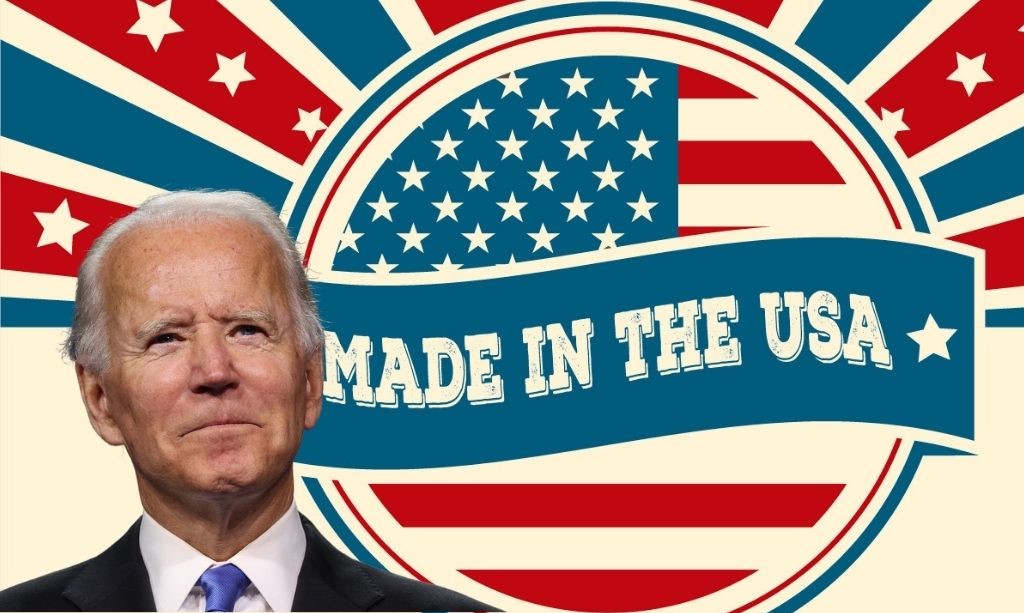The White House highlighted the success of its “Made in America” initiatives in manufacturing and mining in two recent announcements. The announcements included investments and jobs in the auto sector, semiconductor manufacturing, rare earth processing, domestic content requirements and changes to the Buy American laws it says will make it easy for government bodies to purchase Made in America goods.
Like Trump before him, Biden has talked a good story when it comes to manufacturing, but goods imports continued to soar, reaching an all-time record $1.1 trillion last year. Other missteps by Biden included the removal of solar tariffs on February 4 and the gradual weakening of steel tariffs, allowing steel imports to increase.
In Biden’s first year, the economy added 375,000 manufacturing jobs – and grew itself out of the pandemic thanks to stimulus and the low-base of forced lockdowns. Manufacturing as a share of U.S. GDP has returned to pre-pandemic levels, the White House said.
Recent Highlights
Recent White House highlights include one by Siemens USA to invest $54 million in domestic production and create 300 jobs manufacturing critical electrical infrastructure for electric vehicle charging stations, data centers, and industrial sites.
And Intel’s latest $20 billion semiconductor investment, this time outside of Columbus, Ohio said to create 7,000 construction jobs at first, and an estimated 3,000 jobs at the Intel site once fully operational.
Over the last 12 months, General Motors announced its largest-ever $7 billion investment to create 4,000 new EV manufacturing jobs at sites across Michigan.
MP Materials, which operates the only rare earth mine in the U.S., announced a $700 million investment to establish a fully domestic end-to-end supply chain for permanent magnets by 2025, which are used in electric vehicle motors, wind turbines, and defense systems. Most of that mine has been offloaded to a China partner for years. But this is a separate deal.
“The Biden plans on rare earths are exciting because they address the entire rare earth supply chain, including mining, processing, and magnet manufacturing,” said CPA chief economist Jeff Ferry. “We have always said that the U.S. needs to think about reshoring not just individual products but entire supply chains, to avoid China dependency. The war-related chaos in commodity markets today only reinforces the self-reliance issue. The MP Materials investment raises the question of who will use those magnets. We still do not manufacture enough motors and similar electronics here to purchase those magnets. But it’s a step in the right direction.”
Like MP Materials, some of the recent manufacturing support comes from government purchase orders.
American Fashion Network, a U.S.-based woman-owned small business, pivoted from strictly commercial work to manufacturing masks for the government during the pandemic. They got a government contract in 2021 for $46 million from the U.S. Marine Corps, which includes non-pandemic related apparel. They have manufacturing facilities in Garden Grove, California and in Rochester, New York with roughly 120 people employed.
Ferrara Manufacturing, a family-owned New York City business, began making personal protection equipment (PPE) for city hospitals in spring 2020 at the start of the pandemic and were later given a federal contract to make millions of PPE and other non-pandemic related apparel under defense contracts. Their apparel is manufactured in New York City’s Garment District, where they employ over 100 union workers. In 2022, the family hopes to add 150 new manufacturing jobs in their newly built factory in Queens, New York City.
The White House put out a fact sheet of their recent Buy American purchases and unrelated corporate investments on February 4.
One takeaway from the fact sheet is the government’s role in maintaining critical supply chains in the U.S.
During the pandemic, the U.S. had limited availability of PPE and face masks, with people making them out of imported fabrics, or buying paper masks by the boatload from China.
As for rare earths, key materials that go into making military-grade radars and global positioning systems rely on raw materials often sourced from China. The U.S. needs to place large, long-term orders for these critical materials to make these markets viable.
The Biden administration did scrap an Executive Order by Trump that would have closed off World Trade Organization (WTO) members of the Government Procurement Agreement (GPA) from bidding on U.S. government contracts for critical medications. The Biden administration did that out of concerns it would run afoul of WTO rules, and cause U.S. companies to lose out on bids abroad among WTO GPA members, as well.
Many believe the GPA remains one of the most difficult roadblocks for Buy American rules to overcome because it puts foreign companies on equal turf with U.S. companies for taxpayer-funded projects.
Still, the creation of the new Made in American Council this January, led by Celeste Drake, shows the focus is shifting from a globalist worldview to one where reshoring supply chains – especially critical ones – has moved to the fore.
This change in viewpoint is giving the old order a run for its money.
American political forces are increasingly moving away from the corporatist, Asian tilt that has hamstrung the U.S. economy and put it at great risk to big cycle disruptions caused by new rising powers, namely China.












